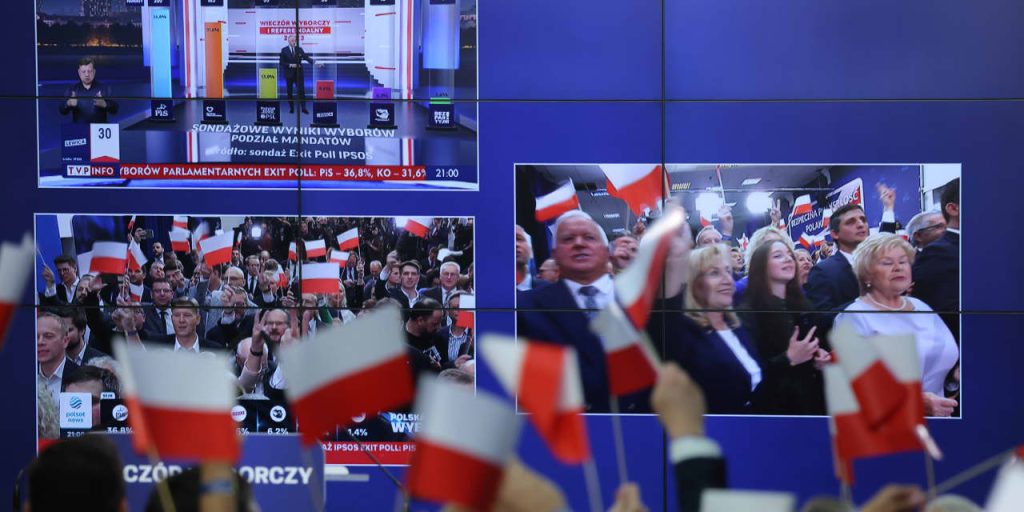Rumors of the death of a united Europe have once more proved to be exaggerated. In a big way.
Poland, the giant of postcommunist East Europe and the European Union’s No. 5 economy, pulled a 180 in Sunday’s parliamentary election. An opposition coalition led by Donald Tusk, who became European Council president after his last stint as Polish prime minister, looks set to wrest power from incumbent Mateusz Morawiecki, who was fond of declaring himself “fed up with the diktats of European bureaucracy.”
The poll stems an “illiberal,” Euroskeptic tide that seemed to be sweeping Europe’s eastern flank with recent election victories for Viktor Orban in Hungary and Robert Fico in Slovakia. It likely quashes any possibility that Poland would break with the EU consensus on backing Ukraine. “The results are signaling that Poland is coming back to the heart of Europe,” says Eoin Drea, senior researcher at the Wilfried Martens Centre for European Studies.
Markets liked the result, too. The
iShares MSCI Poland
exchange-traded fund (ticker: EPOL) jumped 7% on Monday.
The dynamics of Poland’s election will sound familiar to U.S. readers. Morawiecki’s Law and Justice Party (PiS) is strong among older, more rural, more religious, less educated voters. Banning abortion, cracking down on immigration (Ukrainians excepted) and “Poland First” rhetoric are key selling points.
Tusk’s Civic Platform (PO) and presumed coalition partners dominate among younger, upscale city dwellers. A larger-than-expected youth turnout was key to his upset victory, Drea says.
Some details are country-specific. Tusk & Co. had to overcome a state media that PiS turned into a propaganda machine during eight years in power. And the PO needs two other parties, Third Way and an upstart group known simply as The Left, for a legislative majority.
That’s where Tusk’s problems could start, says Aleks Szczerbiak, a professor of politics at the University of Sussex. “The one thing the three partners have in common is getting rid of Law and Justice,” he says. “Beyond that it’s a very heterogeneous group.”
They will be challenged to find a common approach to reining in a government deficit that has swelled to more than 5% of gross domestic product, from less than 1% before the pandemic. Third Way tilts right-of-center, Szczerbiak says, and will look to pare back PiS social transfers, which are focused on seniors and families with children. The Left, as its name implies, wants more generous benefits.
Civic Platform itself is a “non-ideological party, but also wants more benefits and tax cuts,” he says. All three parties are committed to large increases in military spending to counter a more aggressive Russia. They will also have to contend with the veto power of PiS president Andrzej Duda, who remains in office until 2025.
On the bright side, the EU is likely to hand Tusk a signing bonus of sorts, releasing some 36 billion euros ($38 billion) from a joint Covid recovery fund, which it withheld from PiS for violation of various democratic norms. That comes to about 0.5% of Poland’s annual GDP. Bond markets gave the new government-in-waiting a mild vote of confidence: Spreads on 10-year Polish paper tightened by 17 basis points to 5.66%.
Comity between Brussels and Warsaw may not last too long. Migration is one sticking point, Szczerbiak says. Most Polish voters probably remain wary of EU plans to share out immigration quotas among member states. Renewable energy is another. Poland still depends on coal for 70% of its electricity, highest in the EU. A cutoff of Russian natural gas last year only increased that dependency. The country still employs some 100,000 coal miners.
Combine all that with an economic downturn in Poland’s core Western European export markets, and the 66-year-old Tusk has his work cut out for him, says Matt Gertken, geopolitical strategist at BCA Research. “Tusk is likely to have a short honeymoon,” he says. “This wasn’t a resounding or crushing victory over the PiS right wing.”
Still, the day’s headline is that the EU, which looked to be on life support last decade through the Greek debt crisis and U.K. Brexit, has revived to a near death-and-taxes inevitability. Thank Vladimir Putin, whose Ukraine invasion pushed the rest of the continent together, and an abiding economic symbiosis between Old and New Europe.
Foreign direct investment flows into Poland have smashed all records in the postpandemic years, reaching nearly $30 billion in both 2021 and 2022. South Korea joined traditional sources Germany and Switzerland as a leading partner. With average monthly wages around $1,600 in Poland, compared with $4,200 in Germany, the boom could last regardless of who is in power.
“Poland never really had another option than the EU,” Gertken says.
Write to editors@barrons.com
Read the full article here
